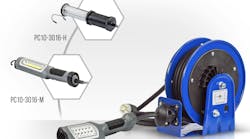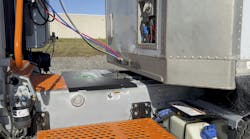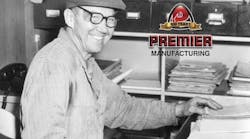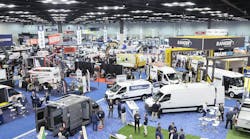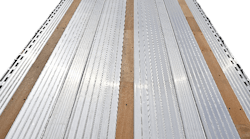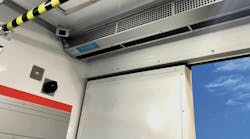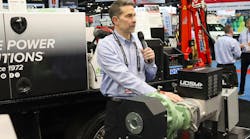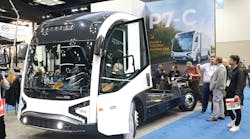Las Vegas. Homeless Superman doesn’t stand a chance in the long run, but he could be a problem today.
I was strolling down The Strip, reflecting on Heavy-Duty Aftermarket Week that was being held here. My walk comes after a series of presentations and discussions during which exciting, professional motivators fired up the HDAW audience to world-beating levels of confidence, only for that enthusiasm to be modulated by real-world panels of industry representatives—from businesses large and small—who brought us all back down to Earth, to North America circa 2018.
So many opportunities for the heavy-duty vehicle market—for manufacturers, distributors, dealers—were highlighted and then undercut by the many challenges posed by Silicon Valley, by China, by ourselves: ‘disruptors’ and ‘disintermediators’ like Tesla and Uber, e-commerce distribution models and other would-be superheroes of the moment.
But that’s what a good trade event does: It reinforces the possibilities we know are out there, but reminds us to take care of business here and now.
The good news—the great news—is the heavy-duty vehicle business is doing fine and has an undeniable place in the 21st century. The growing risk, and this is no surprise, is figuring out where your business fits on the continuum of disruption—and then what to do. (For those who’ve been so profitable and comfortable that the term ‘disruption’ doesn’t mean much: Tag, you’re it.)
But back to Homeless Superman. For reference, The Strip in 2018 is fully staffed with people in costume: You can spot an Elvis in any of a variety of styles, and young women with tight outfits highlighted by a few strategically placed feathers still tout the casino shows. And the sidewalks now are crowded with freelancers dressed as Star Wars characters, Lego creations, video game icons—all vying for $1 selfie photo opportunities.
Then I see him, as he pushes aside another man who looks to be a Buddhist monk (I kid you not). His Superman costume has seen much better days. His reddish cape is faded, frayed and stained and the sagging blue tights have holes. He carries a overstuffed shopping bag of belongings that doesn’t quite fit the image of a superhero. Tourists on the sidewalk move away as he approaches. This isn’t the result he’s going for.
Homeless Superman isn’t the kitsch Las Vegas—impressive but re-imagined fantasy copies of Rome or Paris or even Manhattan—he’s the downside of hustles gone bad. And he’s what HDAW has been warning us about. But not in the obvious way.
Sure, an icon of past glory is a reasonable symbol: Superman represents American optimism of the 1950s, and he’s worn out.
Times change. But you should know that already. The constant message at HDAW: Relationships are critical. It’s not about getting a golfing buddy to renew a contract because you’re golfing buddies. It’s about being able to understand a customer’s needs and solving problems. Value isn’t the computer-moderated lowest price for a commodity at the moment. Value is long-term success.
And it will take real super-powers to overcome the pressures of this new era of zero-margin pricing. The thing is, that’s really not much different from the way business has always been done, or should’ve been: You must compete—it just better be on more than price.
Real superheroes serve their customers and become indispensable. Superman, in his heyday, did a lot of great things, but that was on a one-and-done basis. And it was the comic books. I don’t think any of us have to worry about Lex Luthor—well, depending on how strongly you feel about Elon Musk or Jeff Bezos.
Indeed, homeless Superman is not us; he’s not the symbol for the decline of America broadly, or of businesses who can’t keep up with an evolving, digital, data-driven and connected world.
Homeless Superman is a knock-off, an imitation, looking to take advantage of another brand. He is a bad guy, an opportunist who doesn’t care at all about his customer, except for that $1 photo opportunity. But that doesn’t mean fly-by-night hustlers can’t manage to pick up a buck here and there, and sooner or later steal your business.
And, since this is the annual Distributor issue, I should emphasize that relationships go both ways. Distributors, as middle men, are especially susceptible to being squeezed. The owners at the companies featured this month (Northland Equipment Company and Powers Truck & Equipment) each complained of problems with suppliers no longer respecting long-standing relationships, and this comes at a time when their customers are being tempted by online promises of better deals.
Their solution, and the solution much discussed at HDAW: Make sure both suppliers and customers truly appreciate what you do for them—and it has to be a lot more than just the price on the invoice. Superman doesn’t wear a dollar sign on his chest.
Complete coverage of HDAW and Heavy-Duty Aftermarket Dialog:
Aftermarket outlook: Global competition, emerging tech present challenges, opportunities
Fleet panel dissects parts, service

